21
Apr 2021Noodle-Noodle-Noodle Noodle Shop
Wow, this is quite the noodle shop name I photographed here in Shanghai:
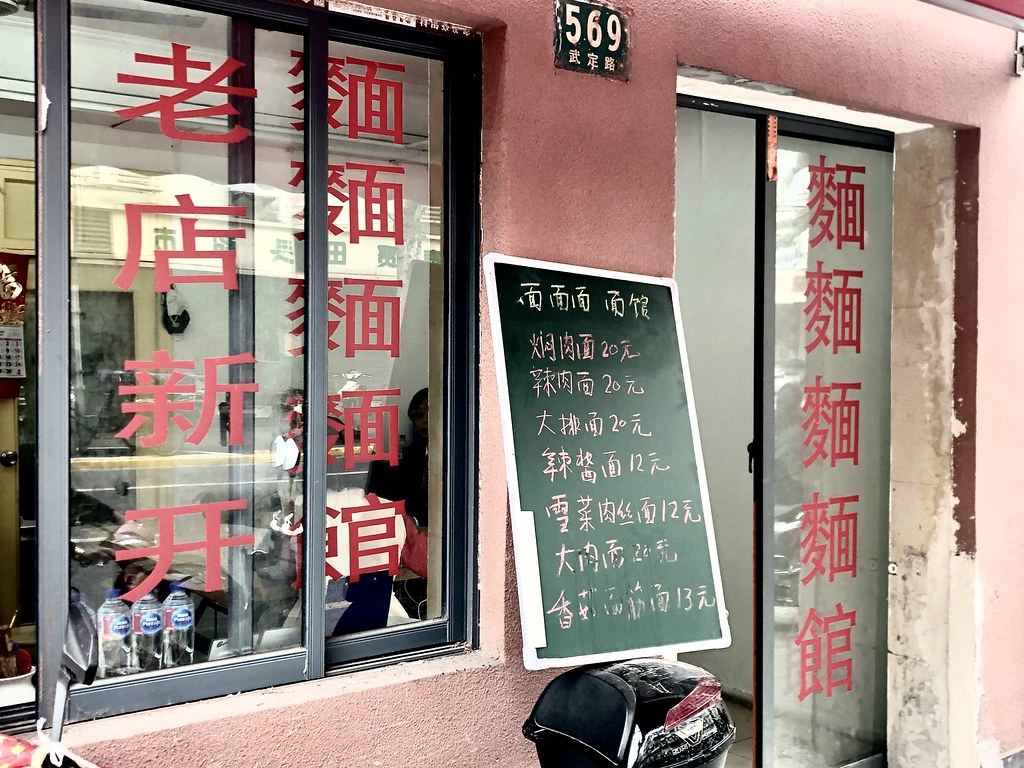
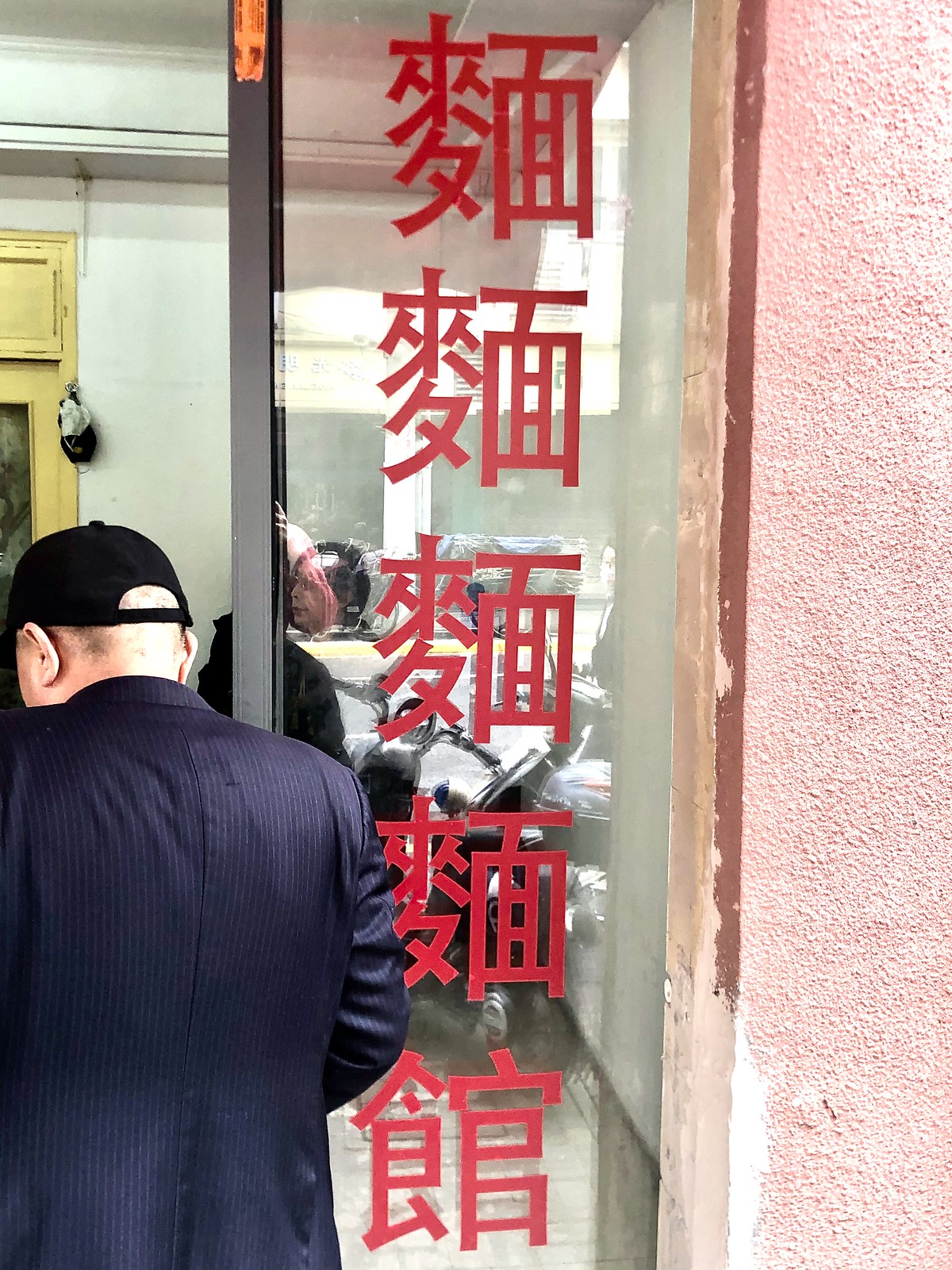
The Chinese name is 麵麵麵麵館 which is written in traditional characters. (Sometimes shops do that because they simply prefer the traditional character aesthetic.) The simplified characters would be 面面面面馆.
It’s kind of fun how the traditional character 麵 has 麥 as a meaning component, which means “wheat.” And of course wheat is the main ingredient of noodles. You could say that the character ingredient is the main noodle component. Or whatever. The simplified version, 面, retains none of those semantic shenanigans, using just the no-nonsense “miàn” sound component to mean “noodles.”
15
Apr 2021Beijing AI Park’s Smart Slogan
A friend shared this technological park’s logo, and the 智 character caught my attention:

The full text of the slogan is:
集智未来 (Jí Zhì Wèilái)
Although “集智” is not a word, through the semantic power of Chinese characters, 集 brings to mind the idea of 聚集 (to assemble) or 集中 (to concentrate), while 智 suggests 智慧 (wisdom/intelligence). Also, 集智 sounds identical to the word 极致, which means “highest achievement.” Furthermore, the character 智 is associated with the word 智能, a very common word in tech nowadays, meaning “intelligent” or “smart” in the sense of “smartphone.” 未来 just means “the future.”
While I think the 智 character in the logo looks cool, as a non-native speaker (reader) I find the 日 element at the bottom just a little hard to immediately recognize. What do you think?
08
Apr 2021Joining the Vaccine Rollout
When I wrote my last post, COVID in Shanghai: March 2021 Update, I had been unable to make a vaccination appointment. I was unsure why at the time, but it looks like the vaccine rollout to foreigners was just intentionally slow to get going, and the first few days were quickly fully booked (maybe even at midnight?).
My wife and mother-in-law got in touch with our local community officials, who promised to give them a call when more vaccine slots were available. And they actually did! We got the call on Friday, April 2, and I was able to follow the exact same process I followed before (using the official online system on my phone). This time there were appointments available. I was able to schedule one of the very next day.
A few photos:


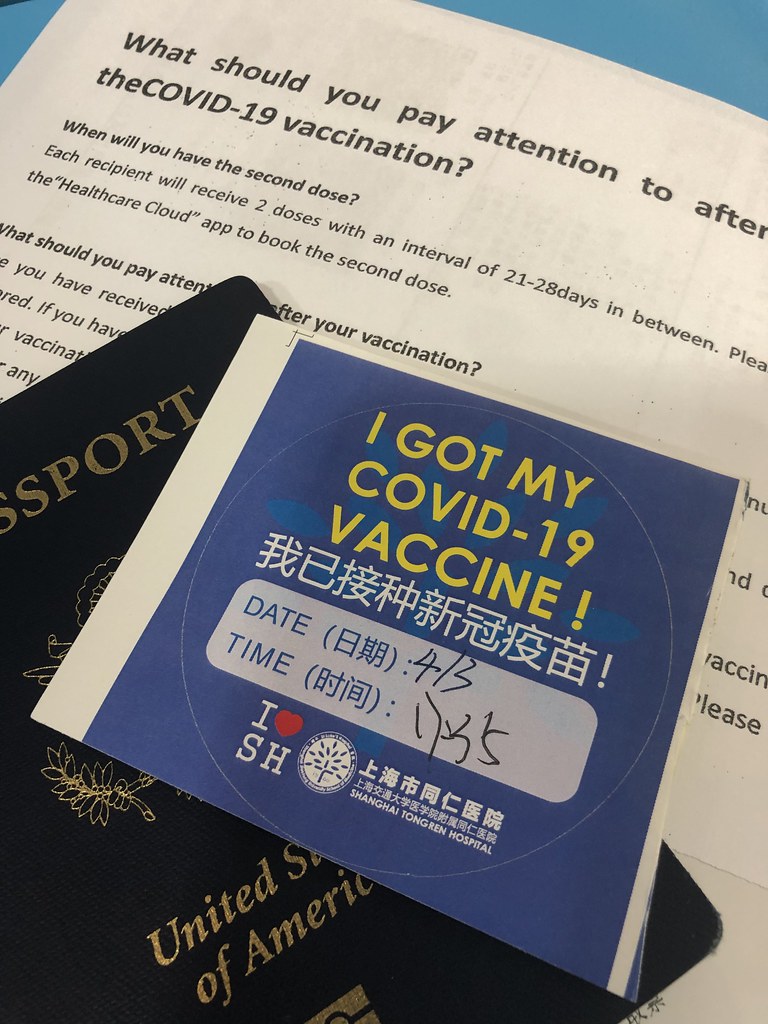
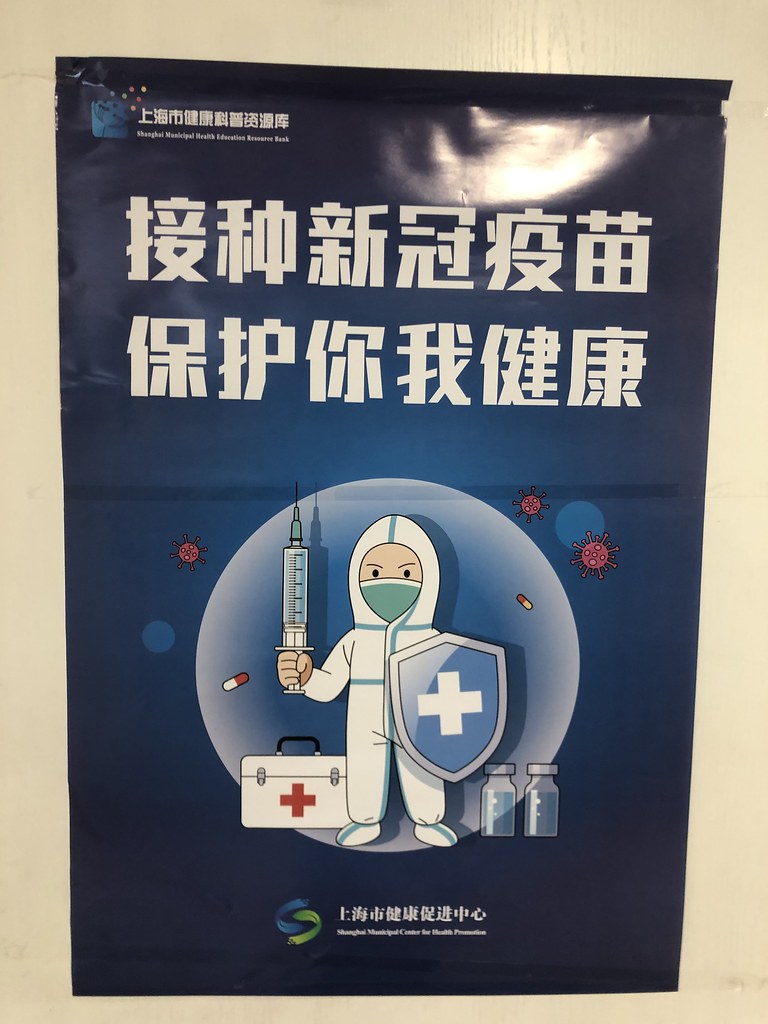
So yeah, I’ve had one shot of the Sinopharm vaccine, and I’ll be returning for a second shot 21 days after the first. Vaccinations seem to be proceeding quite swiftly here, with foreigners and the elderly alike all signing up.
31
Mar 2021COVID in Shanghai: March 2021 Update
I’ve been reading a lot of American news about progress getting the U.S. population vaccinated against COVID-19. Up until last week, it did not feel like much progress with vaccinations was being made around me, where I live in Shanghai. Then BOOM! starting last week, it seemed like suddenly everyone around me was getting their first shots.
There’s an interesting attitude about the COVID vaccination among Chinese friends I talk to. Almost no one I talked to wanted to get it early, but pretty much everyone seems to be getting it now. Last week when I mentioned that old people (over 59) can’t get vaccinated yet, the universal reaction was, “that would be too risky!” So there seems to be a common distrust in the quality of the medical testing, but also a general commitment to everyone getting vaccinated. But this week the elderly are starting their their vaccinations in Shanghai already. My 70-year-old Shanghainese mother-in-law is getting vaccinated right now, as I write this.
And what of us foreigners? There has been more than a little cynicism among expats I’ve talked to. Surely we’re absolute lowest priority? A Chinese friend, echoing the lack of faith in medical testing I mentioned, said something along the lines of, “it’s too risky to give the Chinese vaccinations to foreigners early, because if anything goes wrong, it’ll turn into a big news story.”
But COVID vaccinations for foreigners started this past Monday, March 29. You can sign up through WeChat. Still, I don’t actually know anyone here who’s done it here, and my own attempt to make an appointment failed. Whether that was due to high demand or a buggy reservation system rollout, I can’t say.
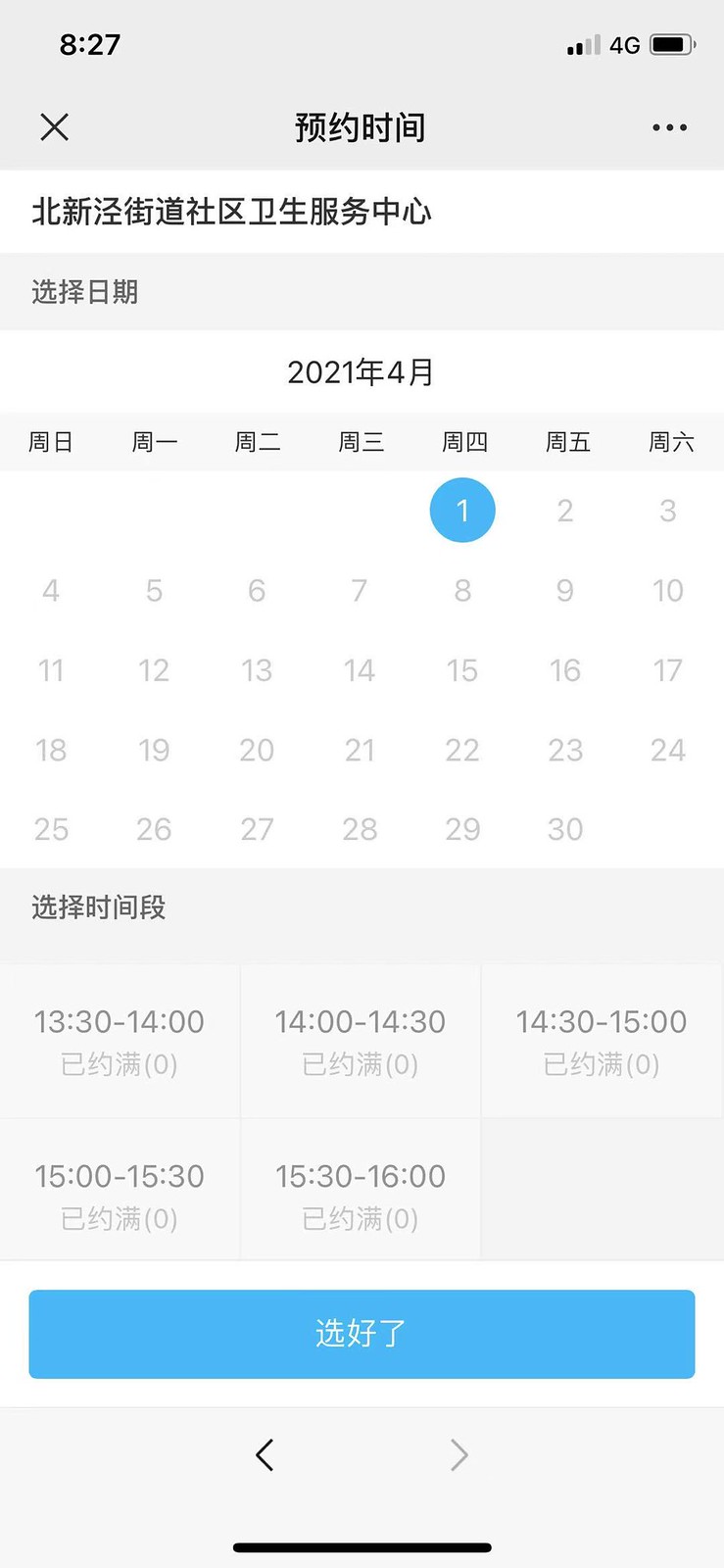
I expect that a lot of foreigners living in Shanghai will be getting the vaccine in April, though. You could say that vaccine is the key that unlocks our gilded cage. A lot of us are itching to get out of China, even for just a little while (even if it’s not yet practical to go back to our home countries for a visit).
Meanwhile, life continues in Shanghai more or less as usual, with masks required in some places (public transit, hospitals, etc.) and large shopping malls taking the temperature of anyone who enters.
24
Mar 2021DATASS got my attention
I was doing some online shopping on JD.com. In a sea of iPhone charger cords, DATASS stood out:
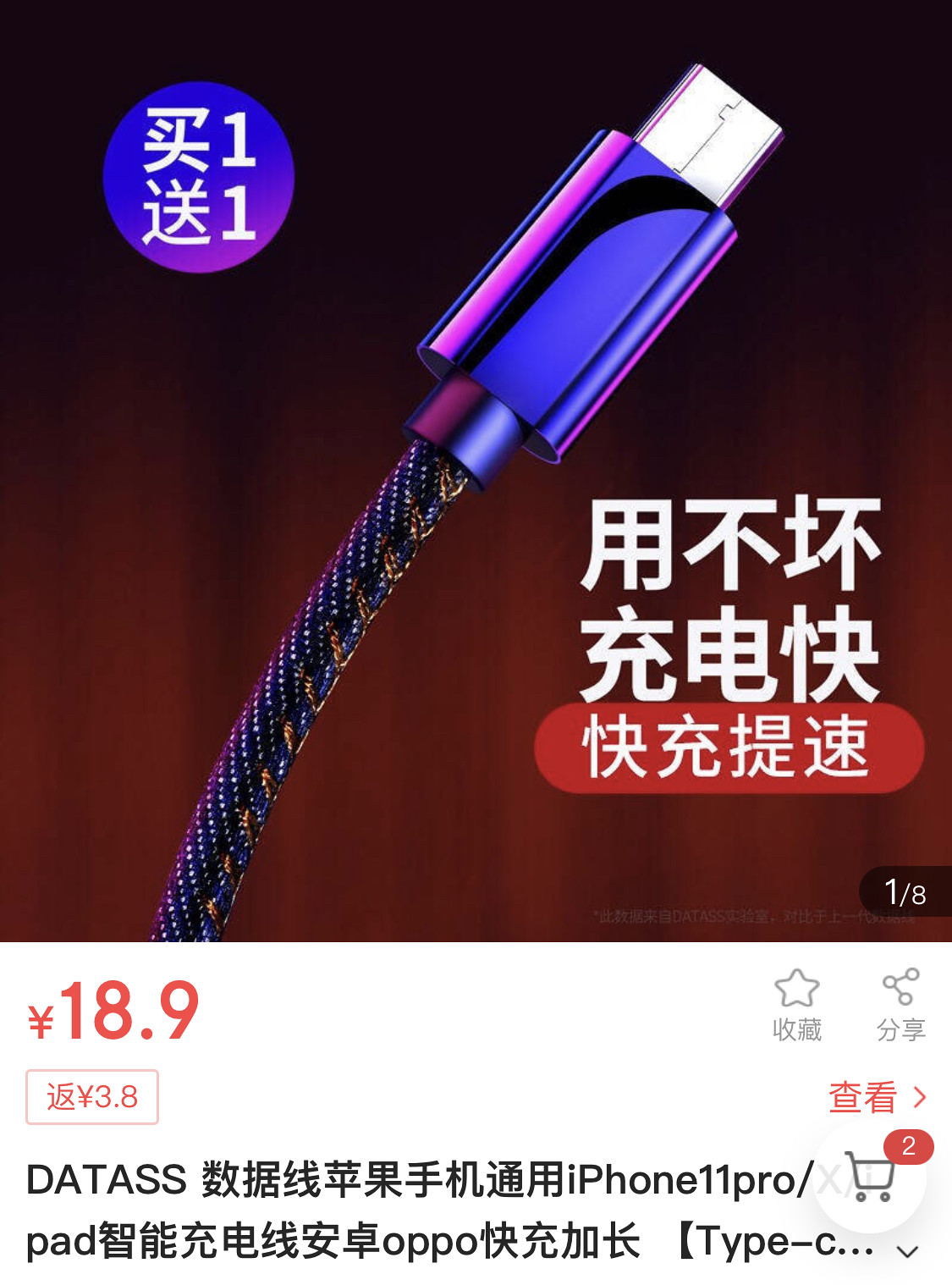
Sure, it’s puerile, but it worked. I do wonder what the story is behind that name. Is the name a random coincidence, or an intentional joke?
16
Mar 2021Upper Intermediate Print Grammar Book: DONE
Well it took forever, but our B2 “Upper Intermediate” Chinese Grammar Wiki Book is finally available in print form.

This one turned out to be way more trouble than the last one, but I’ll resist the urge to turn this post into a rant. There are a few special grammar point details on the AllSet Learning blog post, but I also thought I’d share the book’s dedication text, since our proofreader enjoyed it and found it noteworthy:
For all of the upper intermediate
and advanced learners, who rightly
feel that no new materials are ever
created just for you. We’ve got you.
A hint of things to come?? Maybe, friends. Maybe.
Carry on, upper intermediate learners!
11
Mar 2021Baby Vision: not what you think
It’s just a result of this particular point in American pop culture history, but when I see this “Baby Vision” ad in Shanghai:

…I immediately think of this “Baby Vision” instead:

(Yes, that second photo is from WandaVision. The first one is an ad for an optometrist’s services in Shanghai.)
Going more for meaning over sound, Marvel Vision’s name in Chinese is 幻视 (Huànshì). So, following the model of Baby Yoda (尤达宝宝), I guess it would be fair to call Marvel’s Baby Vision 幻视宝宝 in Chinese.
03
Mar 2021A Third Grader’s First Taste of Classical Chinese
My daughter is now in third grade in a Chinese school in Shanghai. She was just exposed to her first 文言文 (classical Chinese) passage at the end of last semester. (The kids have all been studying classical poetry since at least first grade, but that’s different.)
The passage she studied is a story that Chinese schoolchildren have been learning for generations, and it comes from the national standard Chinese language (语文) textbook (Lesson 24) third graders all across China are using. Here’s the passage in plain text:
司马光砸缸
群儿戏于庭,一儿登瓮,足跌
没水中,众皆弃去,光持石击瓮破
之,水迸,儿得活。
(If your Chinese is good enough to handle classical Chinese, I’m going to assume you don’t need pinyin. Here’s a Baidu Baike article on the passage.)
It’s a story about Sima Guang, a boy who saves the life of a child that fell into a (full) ceramic water jar by bravely smashing the jar with a rock. (This story seems to promote “out of the box” thinking, which honestly feels a little off in the current Chinese education system!)
And here are my daughter’s notes on the passage from class:

Yikes!
I asked her if she liked studying classical Chinese. She remarked that it was fun, because it was like using Chinese to study a foreign language. Interesting perspective! (I think a lot of us foreigners just see classical Chinese as “super mega ultra difficult Chinese.”)
If anyone has any questions for third grader just starting classical Chinese, I’m happy to pass them along and report back.
23
Feb 2021Full Archives Updated
I’ve been wanting to update Sinosplice’s full archives page for a whole now in order to make it… well, fuller. Unfortunately, that meant it was broken for a while. It’s working again, however.
I did something I don’t see often on WordPress sites: I stuck every single blog post all on one page, and added in dates, categories, and tags for good measure. It’s kind of crazy. It makes a simple text search on that page surprisingly effective for a lot of things.
I still need to revise the styles on that page, but it’s working just fine in the meantime.
07
Feb 2021SRS Flashcards: Pros and Cons
The “SRS” in “SRS flashcards” stands for Space Repetition System (or Software). While SRS is the technical term which harkens back to the algorithm used by legendary developer Piotr Woźniak for Supermemo, nowadays many language learning systems/platforms incorporate some form of SRS, usually just calling it “intelligent flashcards,” “smart review,” or something like that.
In the 15 or so years I’ve been watching SRS evolve, I’ve seen its status go from “emerging exciting technology” to “over-hyped, over-used cliche.” And yet it’s still got a lot to offer, if you don’t treat it like a panacea of language learning. So, time to get right to the point and discuss: pros and cons of SRS (specifically, SRS flashcards for language learning).

Pro: You have a list of everything you’re learning
- It may be easy to add everything (one-click download and add?).
- Nothing falls through the cracks if your system is solid.
- Many study programs over-emphasize new content and don’t provide enough review. SRS is one way to make sure that the older material you learned doesn’t fade away but rather gets cemented into your long-term memory as you move through the course.
Con: You have to make a list of everything you’re learning
- It’s some work to build a list, especially if you’re learning entirely on your own. (For example, if you’re using Anki, you might not even know about the Pinyin Toolkit plugin, which is essential for Chinese.)
- As a beginner, you may have a hard time knowing what to add now and what to leave alone for now. To get really good results you have to choose the right words to add, and knowing what to add is a skill.
- The DIY factor: the more effort you put into making flashcards (or any learning activity), the better you’re going to remember it. Another way to put it is: “easy come, easy go.”
Pro: Regular review is all prepared for you
- Regular review is prepared, on a schedule that you choose!
- You can set the number of words in each review.
Con: Regular review is always prepared for you
- If you have a ton of flashcards, the amount of reps you need to do every day can be a burden.
- Setting the number of words you review every day may not work well if you’re adding way more words than you’re reviewing.
- If daily flashcard reviews become a chore that you dread (and the majority of the time that you spend “studying”), it can sap your motivation for learning.
Pro: You never forget anything
- ‘Nuff said! Never forgetting has quite an appeal.
- Some people even go so far as to think of their SRS vocabulary as an extension of their own memory. (Is that a pro? Not sure!)
Con: You’re not allowed to forget anything
- If you’ve added words of questionable usefulness, they will become “leeches,” showing up in your reviews again and again, but never showing up in your studies, conversations, or readings. (This can be obvious, in which case you might just delete it, but it can also be very subtle, and hard to determine if you should keep the word or not.)
- Not all words have equal value, and SRS doesn’t (normally) make any kind of value determination; it assumes that you need to master every single word, and each word is treated equally.
SRS Appeals to Certain Types of Learners
Over the years of working with lots of different learners of Chinese through AllSet Learning, I have noticed a very clear trend: analytical, programmer-types loooove SRS. It’s the efficiency of it, having the “checklist” where nothing gets omitted. These types of learners can find SRS a Godsend which changes their studies completely, and they often evangelize for SRS quite a bit.
However, learners much more interested in talking in Chinese, or reading in Chinese, may find the preoccupation with flashcards a bit off-putting and unnecessary. If you really are speaking Chinese all day, or reading for hours and hours every week, you may not need SRS flashcards as much.
Which type of learner are you? How useful have SRS flashcards been in your own studies?
Podcast Discussion
Jared and I covered this exact topic in the You Can Learn Chinese podcast, episode #55. The main discussion on SRS takes place 07:00~31:50 (about 25 minutes).
Here are some of my past posts about SRS:
03
Feb 2021COVID in Shanghai: January 2021 Update
For most of 2020, it felt like COVID was slowly disappearing in Shanghai, even as the pandemic raged in the US and some other places. The cases that popped up in China (that we know about) all felt pretty distant. In January 2021, though, we experienced a small resurgence in COVID cases, first in other parts of China, and then in Shanghai itself.
The government response was swift and decisive. You can look it up online if you’re interested. Not a whole lot of information was publicly disclosed, aside from “we’re handling it,” so rumors were swirling.
I actually know someone who was affected by the recent cases (he had third degree contact), announced on January 24th, and then within a day I saw this image in a WeChat group (no, it wasn’t censored or deleted):
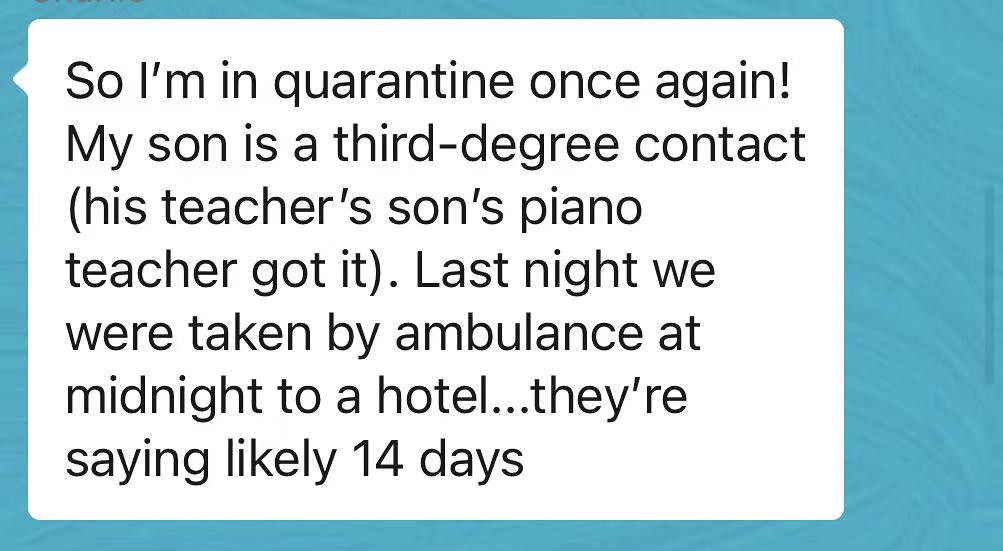
This message was not sent by my friend, but it described the exact same situation: son’s teacher’s son’s piano teacher got COVID. They were doubtlessly both students at the same international school in Shanghai. The kids had the third-degree exposure, not the dads, but the kids were too young to do quarantine alone, so the dads had to join in on the fun.
My friend (and his son) are set to be released from government quarantine (in a decent hotel) tomorrow, after 4 nasal tests and 3 blood tests (as of yesterday).
For us luckier residents of Shanghai, face masks are required on public transportation and in government buildings and hospitals just like the were through the end of 2020, but now requirements have stepped up. More buildings are taking temperatures at the entrances and/or requiring face masks for entry. (Pretty much all malls are). My office building is requiring everyone to show their “health code” upon entry (it must be green).
Many Chinese living in Shanghai that were originally planning to go back to their hometowns for Chinese New Year (Feb. 12, 2021) no longer are. It goes without saying that routine CNY holiday trips outside of China are all off this year.
Everyone’s hoping that as the weather warms and. the vaccine continues to be distributed, things will get better by the summer. We shall see!
(One year later, still unfortunately) Related: COVID Vocabulary in Chinese
20
Jan 2021Robot Coffee (+ bonus pun!)
They aren’t new; there are a number of these “Robot Coffee Kiosks” (机器人咖啡亭) around Shanghai, and more have been popping up lately. Here’s what they look like:

The little attached tablet is how you order and pay (AliPay or WeChat Pay, of course.)

Around 15 RMB (about USD 2.31) per cup is cheap for Shanghai. I just tried it the other day, and the coffee is… not great. I tried the hazelnut latte, and while the company deserves credit for not making the coffee too sweet, they made the bizarre choice of adding way too much crushed hazelnut topping. I was literally chewing my way through half the latte. That’s a first!
I never ever see people buying coffee from these kiosks. I don’t expect them to be around much longer.
Finally, a pun that learners of Chinese can understand (that’s kind of my thing now):

The text reads:
世界“滴”一杯机器人咖啡
The world’s “first” cup of robot coffee
So the pun there is using 滴, meaning “drip” or “drop,” instead of 第. The word for “first” is, of course, 第一. The word for “drip coffee” is 滴滤咖啡 (literally, “drip-filtered coffee”).
06
Jan 2021Flying Fonts in Chinese
I like this text art:

The text reads 迅合行. The shop sells little models and action figures for anime characters. The Chinese name for this kind of product is 手办.
Also, I should note that when I showed the name 迅合行 to Chinese native speakers, they were unsure if the character 行 in this context should be read “xíng” or “háng”. I always find that kind of thing gratifying!
29
Dec 2020Christmas on Ice
I had thought that this year attending Christmas Eve or Christmas Day services would need to be in Chinese, since, as I mentioned before, English language religious services have not been allowed to resume yet in Shanghai. But Chinese services had strictly limits placed on the number of attendees, and there wasn’t enough supply to meet the demand. Foreigners were having secret “lunches” and “dinners” just so they could celebrate Christmas in a religious way.

I don’t like talking about politics much, and I’m not not one to be alarmist about the CCP, even as it becomes increasingly authoritarian in its actions. But this Christmas, I did feel something kind of like a vice tightening on foreigners’ already limited religious freedom here. There’s definitely been an increased sense of “we’re not really wanted here” in the foreign community in Shanghai this year.
We’ll see what 2021 holds… Once the vaccine becomes widely available, the situation will become clearer.
15
Dec 2020Kick Out the Epidemic
Still super busy, so keeping posts light. Saw this jacket yesterday, though:
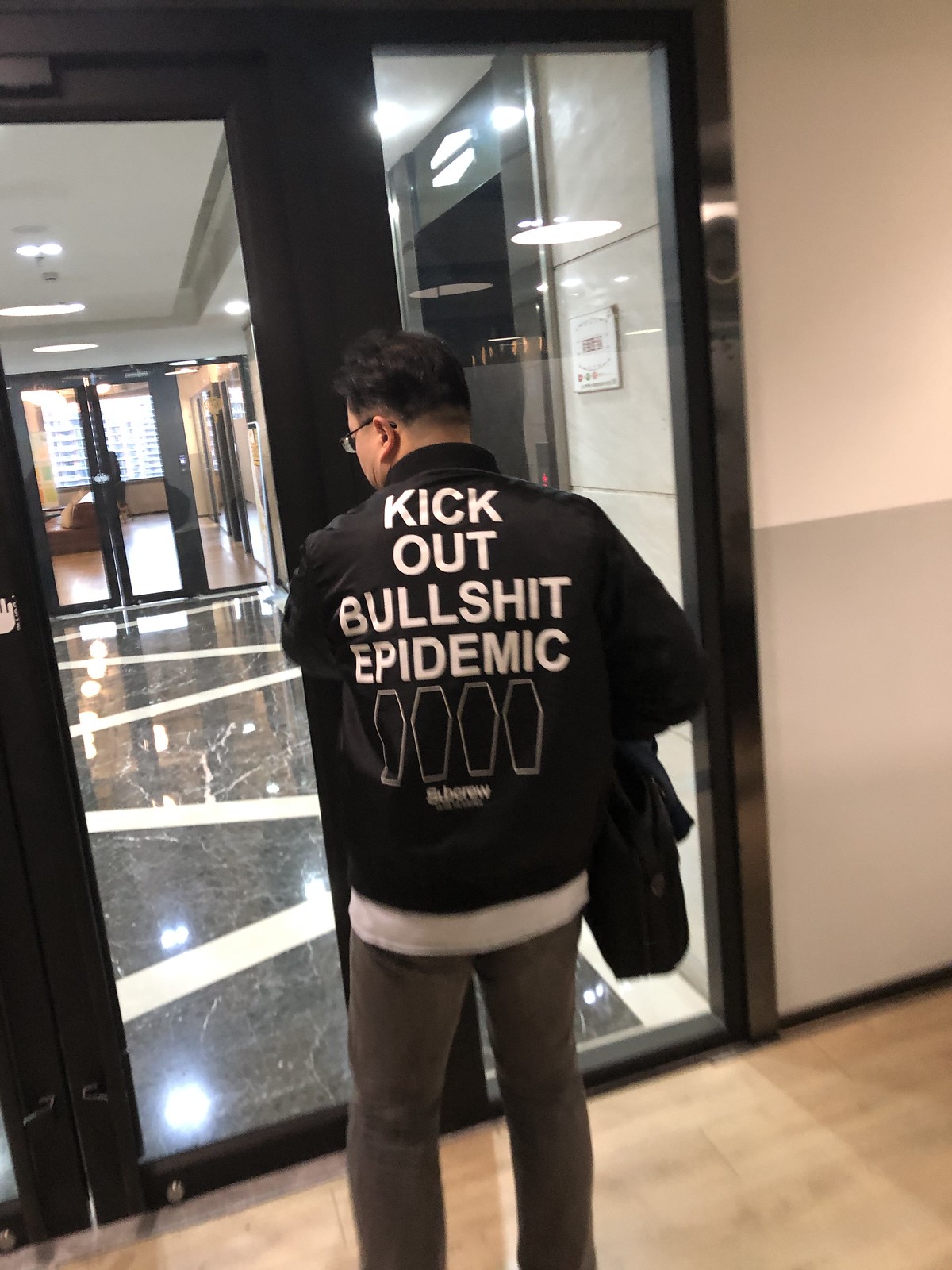
I honestly don’t understand what the message is. Seeing it in China makes it more baffling. (And yes, those are little coffins.)
Stay safe! 2020 will end…
09
Dec 2020The Planet Doesn’t Have Time
I always keep an eye open for interesting English on t-shirts and other types of clothing. Waiting in line at the office elevator this morning, I noticed this message on a guy’s jacket:

It reads:
THE PLANET DOESN’T HAVE
TIME FOR THIS
This message felt so appropriate, during the time of COVID, during a time of ongoing environmental crisis, during a time I am unusually busy at work, waiting in line for an elevator. And it’s Christmastime, too.
Notice that everyone is wearing masks. We had a mini scare two weeks ago at the Pudong International Airport which resulted in more mask wearing again, plus now that it’s winter, people really don’t mind the masks (it helps keep your face warm).
Otherwise, life in Shanghai is pretty normal.
02
Dec 2020Editing MADNESS
Yes, that title is a Ren & Stimpy “Space Madness” reference:

(I’m proudly showing my age.)
So for the latter half of November and the beginning of December, my staff and I are doing a ton of editing, covering all 165 B2 (Upper Intermediate) grammar points (that number still may change) on the Chinese Grammar Wiki. If you’ve ever noticed that some of those grammar points need a little editing, I suggest you take another look. And yes, this book is finally coming!

I actually have a number of blog posts I’ve been meaning to write, but I guess that can wait until I get some more books out…
A new Level 2 Mandarin Companion title is coming as well.
And the You Can Learn Chinese podcasts continue, unabated…
Oh yeah, also doing this winter promotion thing for online Chinese lessons.
Busy, busy.
OK, back to editing!
20
Nov 2020Tone of Voice in Chinese Sentences
Understanding and conveying the proper tone of voice in a Chinese sentence isn’t easy. Some languages (Japanese comes to mind) allow you to “codify” levels of politeness or formality directly into the verbs themselves. Or there are super formulaic sentence patterns for certain levels of politeness. Even in English it’s somewhat formulaic (“Please,” “Can you…?”, “Could you…?”), but less so in Chinese.
I remember talking to an AllSet Learning client years ago about this very issue years ago. She was a mother trying to raise polite children, so of course she taught them to use the word “please” for requests, which in Chinese is 请 (qǐng). So she wanted her kids to use 请 (qǐng) for their Chinese language requests. Seems simple, right? Actually, it’s not at all, because while sometimes “please” can be translated directly to 请 in a straightforward way, in many cases it’s just plain awkward in Chinese, and even super polite people just wouldn’t use the word. To be natural in Chinese, you need a much more nuanced understanding of what polite speech in Mandarin is. And that takes time.
I really enjoyed editing the example sentences for Softening the tone of questions with “ne” on the Chinese Grammar Wiki. (We’re getting ready to release the third volume: B2 / Upper Intermediate.) Here’s a sample:

I’m curious if any readers out there have come across any books, textbooks, resources, etc. that are especially good at helping learners understand tone of voice in Chinese. It seems to me that it’s quite an underserved facet of the journey.
Oh, and for Upper Intermediate fans of the Chinese Grammar Wiki, at AllSet we’re currently working through every single B2 grammar point (we’re almost done with the “Parts of Speech” section of the big B2 grammar point list), editing sentences, adding/fixing pinyin, improving translations, removing “stub” tags, and even rearranging entire articles and reworking explanations. If you have requests or suggestions, now is a good time!
17
Nov 2020Catholic Mass in Shanghai in the Time of COVID (2020)
I’m often asked about the COVID situation in Shanghai. The truth is, things are almost normal now. We do have to wear face masks on the subway and in places like hospitals. But other than that, things are pretty normal.
There is one notable exception, though. English Church services for foreigners have still not been allowed to resume, even though church services in Chinese resumed months ago. (I assume it’s the same for Catholics as for other Christians, but I’ll correct this if I’m wrong.)
I hear a lot of foreigners assuming that this is the government taking the opportunity to “tighten its grip” on religion, and that’s certainly possible, but I’m not so quick to assume malicious intent. I think it’s just way easier for the government to control the situation when there are no foreigners or foreign languages involved, and it just doesn’t want the hassle. (Nor does it place great value or priority on any kind of freedom of religion, however.)
Anyway, I took some photos last Sunday at the Xujiahui cathedral, St. Ignatius. You have to sign in at the gate, fill out a form, and display your health QR code to get in. (The “pass” they give you is good for a month, so you don’t have to fill out the form every week.)

There’s also social distancing going on, marked with smiley face stickers instead of X’s:

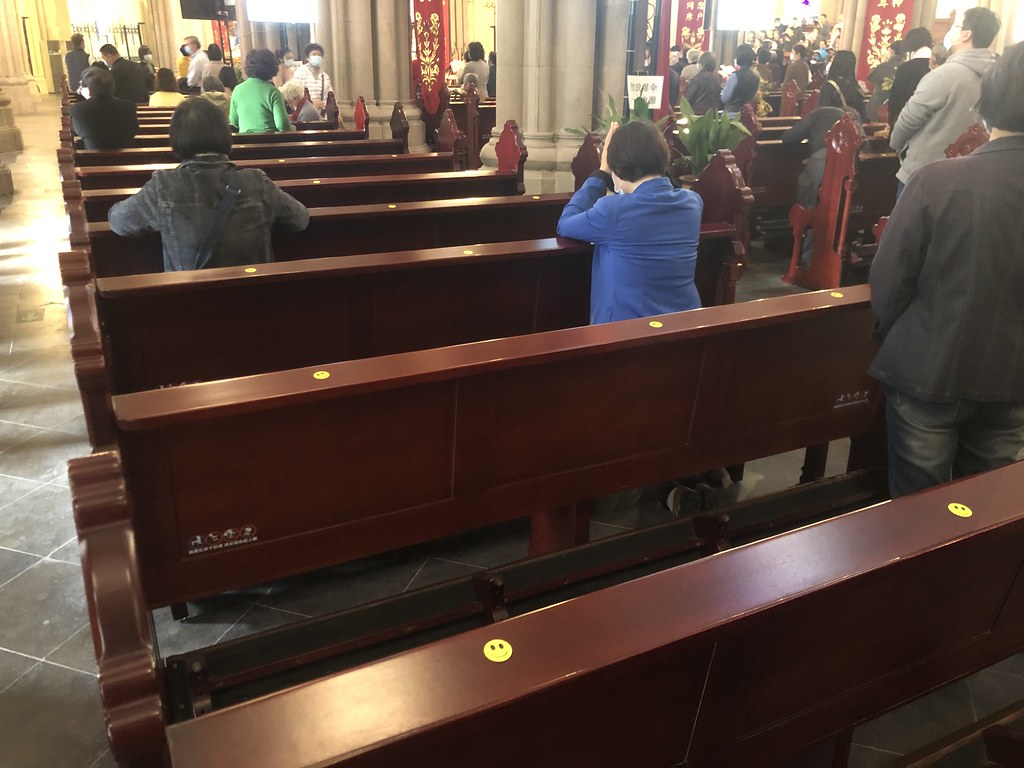

Somewhat surprisingly, Communion is distributed at mass.
Life goes on…
2021 Update: English services resumed May 15, 2021.
11
Nov 2020G-Hub High-pi
I’m pretty sure I’m the only one that actually took a close look at this sign, but there’s a lot going on here:

It reads:
G-Hub 欧洲啤酒节
一起来HIGH啤
Here’s what’s happening:
- G-Hub for “German Hub”? OK…
- Beer bubbles for the 氵 water component in 洲 and 酒
- In the character 啤, the word “BEER” replaces the mouth component 口
- Sudsy tops of characters and ice cubes or cheese cubes (??) inside 酒 (I want it to be cheese cubes, but I’m pretty sure it’s supposed to be ice cubes, sadly)
- The pun “HIGH啤“ which sounds like “happy” and uses the word “high” in the Chinese way to mean “excited and happy” plus the character 啤 from 啤酒
